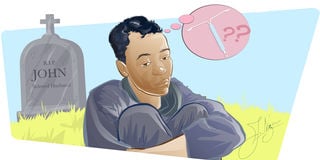Yes, widows too have sexual needs

Yes, widows too have sexual needs. Photo | Pool
What you need to know:
- If you are a widow, make your sexuality part of the conversation in support groups
- Let close friends know this is something you want to talk about as there is a need to normalise this topic
After Dorothy's husband of 20 years died three years ago, she received, in addition to the usual condolences, countless offers of help with matters like children, her finances, and household chores. But no one, not even close friends or grief counselors, dared to discuss a nagging need that plagues many women and men who outlive their sexual partners. The death of her sex life.
In actual sense, it took two years for Dorothy to acknowledge that something was missing in her life, and despite her not wanting to rush into a committed relationship she still had sexual desires.
Experts call it "sexual bereavement," which is defined as grief associated with losing sexual intimacy with a long-term partner. The result, is "disenfranchised grief, a grief that is not openly acknowledged, socially sanctioned and publicly shared."
Dorothy had come to see me because she had a contraceptive –a coil- she wanted to get rid of now that her husband was no more.
The death of a spouse is not a medical reason for discontinuing a contraceptive. While there may be no replacement for a dead spouse, at least not immediately, our bodies' needs may not listen to reason.
The probability of sex may be low for a grieving widow, but life is also never that logical on issues of sexuality. There is a possibility that sex could still happen sooner than imagined.
"I feel hollow and vulnerable, I miss Erick and wish someone could fill that space; I feel that he was unfair to have died at this time. Sometimes I feel annoyed with him but I also know he had no control over his death."
I asked Dorothy what her options were. One was we could remove the coil if it would make her feel better emotionally and if she did not intend to have sex soon. I acknowledged that this was a difficult decision, especially because in many communities a woman in her situation would not be expected to approach men and seek intimacy.
"I am a human being with needs," she explained, "For the last twenty years when my husband was alive my body was used to intimacy and I still have the desire."
Dorothy's story reminded me of a case at the start of my medical career and a certain woman who had been admitted for a botched abortion having conceived three months after her husband's demise. Nobody in her family, she explained, would understand why she had to have sex with another man when her husband's death was still fresh in people's minds. According to her, however, it was unavoidable. The loss, the feeling of hollowness, the loneliness, were unbearable and she jumped at the first opportunity that offered intimacy. She only realised the social repercussions when she fell pregnant.
Dorothy similarly appeared quite vulnerable. She believed that someone would approach her soon, that there would be a new beginning, and that although the memories of her husband will not fade, some intimate relationship would give her energy to move on with her life.
I asked her if she had thought of the medical and social risks involved. It was possible to get exposed to HIV or have an unwanted pregnancy. Further, her relatives, friends, and church members could stigmatise her adding to her stress.
"It would be disastrous to face all that," she says. "But I wish you would also understand what I am going through. I need love, a shoulder to cry on, someone to pour my heart out to. Yes, doctor, I need a man," she admits.
She was still in the grieving period. It was a difficult time and anything was possible. I recommended grief therapy.
I also advised patience on the coil. We did not need to hurry in removing it. As I referred her for grief therapy, I also handed her a pack of condoms to carry home, just in case.
I loved Dorothy's honesty as many widows suffer in silence on matters of sexuality. If you are a widow, make your sexuality part of the conversation in support groups, even if done awkwardly. Let close friends know this is something you want to talk about as there is a need to normalise this topic.
For feedback write to the editor on [email protected]





